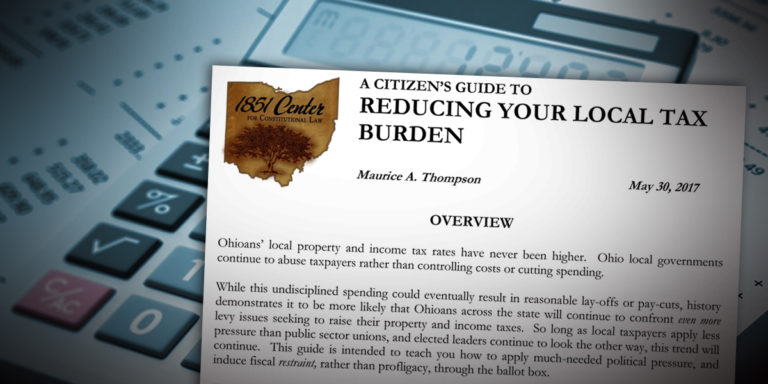Legal Center to High Court: Ohio PAC Laws Violate First Amendment
1851 Center asks Ohio Supreme Court to review Ohio Political Action Committee regulations on behalf of Geauga County Blogger
Columbus, OH – The 1851 Center for Constitutional Law today applied to the Supreme Court of Ohio for jurisdiction over a case challenging the nation’s strictest Political Action Committee regulations.
The legal action is filed on behalf of Edmund Corsi, a Cleveland-area blogger who faces prosecution after blogging about state and local political issues, authoring a pamphlet critical of local politicians, and hosting an informal political discussion group. The state contends that Ohio’s PAC laws required Mr. Corsi to first register with the state and hire a treasurer, and then disclose his home address on his pamphlet and blog, and that by failing to do so, Corsi is subject to criminal penalties and civil fines. Mr. Corsi was referred for prosecution by one of the politicians he criticized – – Geauga County Republican Party chairman Edward Ryder.
The United States Supreme Court has repeatedly confirmed that political speech, even when through group association, in pamphlets or on the internet, is afforded the greatest constitutional protection.
In fact, the Court has already once struck down Ohio’s Political Action Committee regulation, in McIntyre v. Ohio Elections Commission in 1995. There, the Court chastised Ohio courts and the OEC for upholding the regulations after state officials attempted to prosecute a senior citizen for failing to include a “disclaimer” on her homemade flyer advocating against a Westerville property tax increase. Nevertheless, the Ohio Elections Commission maintains that the re-written regulations still require groups of two or more Ohioans who communicate political thoughts to first register as a Political Action Committee, and thereby submit to reporting, disclaimer, and disclosure requirements when communicating.
This case will mark the Ohio Supreme Court’s first opportunity to analyze the re-written PAC regulations, as well as the Court’s first opportunity to consider the effect of the U.S. Supreme Court’s landmark Citizens United decision on Ohio’s campaign finance regulations. There, of potential importance to Mr. Corsi’s case, the Court explained that “the First Amendment does not permit laws that force speakers to retain a campaign finance attorney * * * before discussing the most salient points of our day” (At Mr. Corsi’s hearng, the OEC Chairman advised Mr. Corsi to engage a campaign finance attorney if he wished to continue blogging about state and local public policies).
The 1851 Center’s Motion for Jurisdiction asserts the following:
- Ohio’s PAC regulations unconstitutionally regulate small groups of citizens that spend little or even no money on politics, and do not coordinate with political candidates or campaigns, thereby extending beyond the entire purpose of campaign finance regulations.
- The costs of complying with the PAC regulations, which includes reporting and disclaimer requirements, administrative burdens, the hiring of a treasurer, and the loss of privacy and anonymity of those who speak out by effectively requiring the disclose of the author’s name and home address on government filing, has the effect of silencing protected speech.
- The regulations are unconstitutionally vague and overbroad, because they permit the Ohio Elections Commission members to guess at the “primary or major purpose” of the group, without considering whether they have spent money on politics.
- The OEC improperly overanalyzes Facebook and blogs posts to involuntarily commit a group of citizens as a PAC (federal law prohibits consideration of “internet activities” when determining federal PAC status).
“Ohio’s PAC regulations have long been considered the most oppressive in the nation,” said Maurice Thompson, Executive Director of the 1851 Center. “It would be wise for our Court to hold that the First Amendment does not allow agency bureaucrats and political opponents to use PAC regulations to silence the speech of those who criticize government, using the loss of privacy and expensive reporting requirements of PAC regulations as leverage to intimidate and threaten those expressing differing views, as has been done here.”
Thompson added, “While many Americans fret over government permitting speech by ‘super-PACs,’ they should be more concerned about shocking amount of everyday grass-roots political speech that Ohio is forcing into PAC status – from lawn signs to Facebook pages – and thus essentially prohibiting, at the very same time.”
The case is particularly significant for opponents of local tax levies and “tea party” groups, many of whom are likely to be characterized as Political Action Committees, if the Ohio Election Commission’s ruling is not overturned.
Ohio’s regulations are notable because they are the nation’s only PAC regulations lacking what is commonly referred to as a “monetary trigger”: Ohioans can be forced to register as PACs even if they neither expect to or actually give money to or take money from political candidates or campaigns, and otherwise spend no money on politics.
Read the Geauga Constitutional Council’s Motion for Jurisdiction HERE.











Leave a Reply
Want to join the discussion?Feel free to contribute!